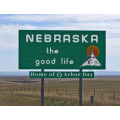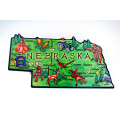Licensed practical nurses (LPNs) perform a number of important tasks in Nebraska’s medical community. Under the supervision of registered nurses (RNs) and physicians, they provide essential patient care like taking vital signs, changing bandages, updating patient health records, and helping patients to bathe and dress. LPNs are employed in a variety of settings including hospitals, private homes, doctors’ offices, and extended care facilities. Practical nursing offers a promising and rewarding career, with the opportunity to pursue RN licensure at a later date.
Nebraska
We've organized a comprehensive list of Nebraska nursing schools. Below you'll find information on specific nursing programs such as LPN certificates and ADN, BSN, and MSN degrees. You'll also find a profile of nursing education and careers in each major Nebraska city.
City-specific information
The Nebraska healthcare community recognizes nursing as a vital service. Nurses enjoy competitive salaries, numerous job openings, and outstanding opportunities for advancement. Fortunately, nursing programs are abundant in Nebraska, especially for students interested in becoming a certified nursing assistant (CNA), licensed practical nurse (LPN), or registered nurse (RN).
Omaha, Nebraska, has the largest nursing workforce in the state. Almost 20,000 nurses work in the Omaha metropolitan area, and this population is expected to increase at a faster-than-average pace for the next decade. Omaha’s new nursing graduates can expect plenty of job opportunities.
Certified nursing assistants (CNAs)
There are numerous opportunities for aspiring nurses in the Nebraska healthcare system. The Lincoln metropolitan area has 7,000 licensed nursing professionals who fill three critical roles: certified nursing assistant (CNA), licensed practical nurse (LPN), and registered nurse (RN). Nursing employment is expected to grow at a faster pace than average over the next decade.
CNA programs and career overview
In Nebraska’s competitive nursing industry, a master of science in nursing (MSN) degree is a critical differentiator. Employers often favor nurses with an MSN degree in their hiring and promotion decisions, particularly for senior positions. Several Nebraska colleges offer MSN programs, including Nebraska Wesleyan University in Lincoln, Creighton University in Omaha, and the University of Nebraska Medical Center campus in both cities.
Registered nurses (RNs) are an important part of America’s healthcare system, and they are therefore in high demand nationwide. Students who wish to enter this gratifying field often pursue a bachelor of science in nursing (BSN). Indeed, many healthcare employers prefer to hire nurses with a BSN degree, particularly for administrative and managerial positions. BSN graduates earn higher salaries and enjoy more opportunities for career advancement than their counterparts with an associate’s degree in nursing (ADN).
Overview of BSN pathways
An associate’s degree in nursing (ADN) can prepare aspiring registered nurses (RNs) for the National Council Licensure Examination (NCLEX) and for many positons in the medical arena. A typical ADN program requires two years of study; alternative programs with night or weekend classes may take a bit longer to complete. Coursework includes the liberal arts, nursing practice, anatomy, chemistry, physiology, psychology, nutrition, and contemporary ethical dilemmas. The state of Nebraska has approximately ten accredited ADN programs.
Licensed practical nurses (LPNs) perform a number of important tasks in Nebraska’s medical community. Under the supervision of registered nurses (RNs) and physicians, they provide essential patient care like taking vital signs, changing bandages, updating patient health records, and helping patients to bathe and dress. LPNs are employed in a variety of settings including hospitals, private homes, doctors’ offices, and extended care facilities. Practical nursing offers a promising and rewarding career, with the opportunity to pursue RN licensure at a later date.
Many nursing students must weigh costs heavily when choosing their school. The all-in cost of nursing education extends well beyond tuition. It also includes registration fees, books, supplies, housing, meals, transportation, and other living expenses. These costs can vary dramatically by both school type and program length. In general, public universities and community colleges cost significantly less than their private counterparts, and two-year (or shorter) programs cost less than a four-year bachelor’s degree.
Nursing programs of two years or less
Unlike their public counterparts, private colleges and universities are not subsidized by the local state government. As a result, private nursing schools tend to carry a higher price tag than public nursing schools. These private institutions carry several important advantages, however.
Nebraska’s public colleges and universities are a popular option for aspiring nurses. These institutions offer several distinct benefits. The first is cost. Public schools are much less expensive than private schools, since they receive significant funding from the state government. Another benefit is convenience. Since public schools often have a number of local campuses, nursing students enjoy a shorter commute.
Overview of Nebraska’s public nursing programs










